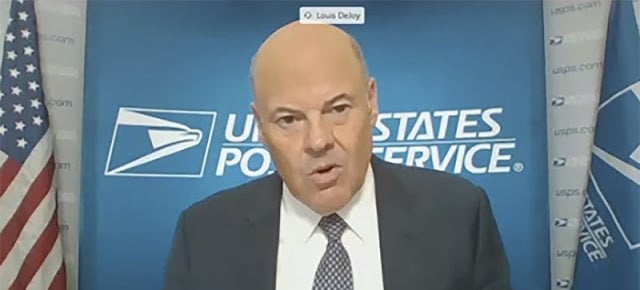Postmaster General Louis DeJoy acknowledged in sworn testimony before a Senate committee this morning that his changes in the U.S. Postal Service have delayed delivery of some mail, but he said he has ordered extra effort to make sure that mailed election ballots are delivered on time.

(Photo by The Associated Press.)
DeJoy said that at his first meeting about election mail, he told his subordinates, “Whatever efforts we have, double them. I was very concerned about all the political noise we were hearing.” He said USPS will have enough capacity for the expected amount of election mail, and won’t require that ballots be first-class mail, thus saving states and localities money, but will treat ballots as first class.
The postmaster general told the Senate Homeland Security and Governmental Affairs Committee that he has suspended operational changes until after the election. “I think the American people can feel comfortable that the Postal Service will deliver on this election,” he said. However, he said he couldn’t provide a detailed plan for ensuring delivery of ballots.
In response to a question from Sen. Mitt Romney, R-Utah, DeJoy said delays have been greater in urban areas “where the coronavirus and the intimidation of the coronavirus” have scared some employees from working, raising absenteeism rates to 20 percent or more in some cities; he said the national rate is only 4%. “A substantial portion of our delays are related to covid,” he said.
DeJoy rejected a suggestion by Sen. Rand Paul, R-Ky., that Congress save money by removing the requirement that mail be delivered six days a week, saying that standard maintains a high level of trust between it and the public. “That is probably our biggest strength that we can capitalize on.”
But when Sen. Josh Hawley, R-Mo., asked about maintaining rural post offices, DeJoy merely answered by stating his previous point a different way: “We have an unbelievable asset in our letter carriers reaching every American each day.”
(NPR’s Kirk Siegler reports “why rural America is fighting the Trump administration on the post office.” Jack Healy of The New York Times reports “what happens when the mail suddenly becomes unreliable in rural towns and stretches of countryside (with) FedEx or UPS deliveries, and where people rely on the post office as an irreplaceable hub of commerce and connection.”)
In response to questions, DeJoy said he had never discussed the Postal Service with President Trump, other than a brief conversation in which Trump congratulated him on his appointment by the USPS Board of Governors, or with anyone in the Trump campaign. Asked about Steven Mnuchin, he said he told the Treasury secretary that he had a plan to improve service, but gave “no great detail.”
He said he would remain independent of the Trump administration, called “outrageous” assertions that his changes are designed to help the president, who has repeatedly attacked universal mail-in voting but endorsed traditional absentee voting. Trump has opposed giving USPS money to handle mail ballots.
DeJoy said he won’t bring back any sorting machines that have been removed because “they’re not needed,” given the decline in first-class mail volume. The machines sort letter-size mail; some states’ absentee ballots are that size. Sen. Maggie Hassan, D-N.H., said the Manchester sorting center now has only one machine, and it broke down yesterday. DeJoy said he didn’t know that.
DeJoy said one of his major changes was to require that mail trucks leave on time. American Postal Workers Union President Mark Dimondstein told MSNBC after the hearing that “We’re being told to leave mail behind, and the system is backing up, and every customer knows that.”
Sen. Gary Peters, D-Mich., the committee vice chair, said he had been unable to get documents relating to DeJoy’s changes, and asked him to provide them by Sunday. DeJoy said he would speak with his staff about that. Another hearing, by the Democrat-controlled House Oversight Committee, is set for Monday, with in-person testimony from DeJoy and Board of Governors Chair Mike Duncan.
(Al Cross is the director of the Institute for Rural Journalism and Community Issues based at the University of Kentucky. This article ran on The Rural Blog is a publication of IRJCI.)
The Rural Blog is a publication of the Institute for Rural Journalism and Community Issues based at the University of Kentucky.






